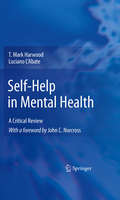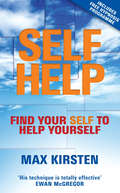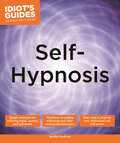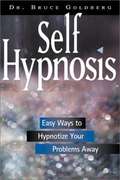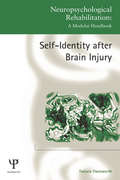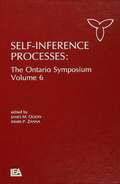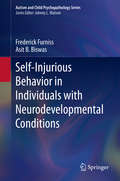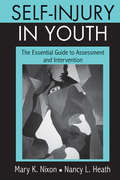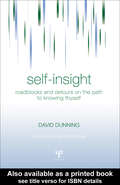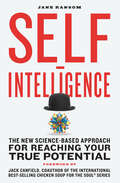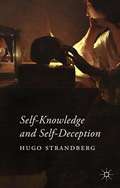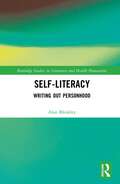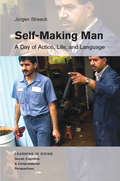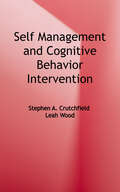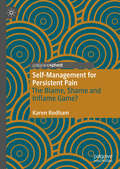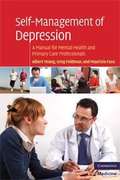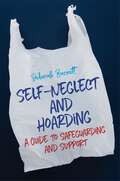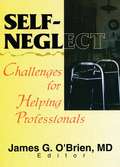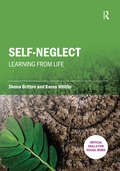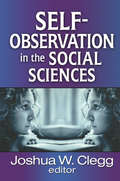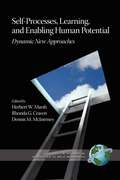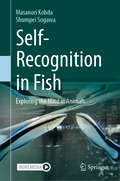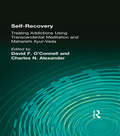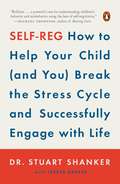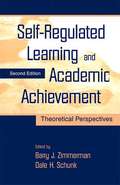- Table View
- List View
Self-Help in Mental Health
by T. Mark Harwood Luciano L'AbateThey're fast, cheap, and promise amazing results--no wonder more people seek mental health advice from self-help books and sites rather than seeking therapy. Complicating this picture: many resources are inappropriate, ineffective, even dangerous. For the clinicians who would gladly recommend self-help for their clients, the challenge is finding reliable, evidence-based sources of help among the vast quantities available. Self-Help in Mental Health: A Critical Review guides readers through this plethora of materials, organizing it into useful order, evaluating popular approaches and trends, and recommending clinically valid, science-based resources for specific clinical and sub-clinical problems. Its authors explain how and why such methods work, offering innovative uses for self-help in prevention and promotion, therapy and rehabilitation, including strengthening therapeutic gains (akin to homework in cognitive-behavioral therapy) and encouraging self-reliance. While some may be tempted to write-off all self-help as quackery or therapy-lite, Harwood and L'Abate recognize the potential the self-help movement holds for countering the stigma associated with mental health treatments. Further, self-help resources represent a viable means of reaching under-served populations, and, for some individuals, they are preferable to conventional therapy. Included in the coverage: Recommendations for books, web sites, organizations, support groups, hotlines, and audio-visual materials, depression, anxiety, eating disorders, addictions, and other conditions, guidelines for evaluating self-help and guided self-support materials, strategies for integrating self-help with traditional modes of therapy, assessment tools for determining client appropriateness for self-help, new directions in theories of self-help and self-change, contraindications for self-help approaches. Concise and comprehensive, Self-Help in Mental Health is timely reading that will enhance the work of psychotherapists and family and couples therapists, as well as researchers in clinical psychology, psychiatry, and other mental health fields.
Self-Help: Find Your Self to Help Yourself
by Max KirstenIn Self-Help, Max Kirsten distils the powerful transformative techniques and processes he used to rebuild his life following two decades of chronic addiction. Max now combines these techniques with mind re-programming hypnotherapy to help thousands of people step out of their problems and become their own solution.Combining his unique vision with personal anecdotes and exercises that anyone can try, Max offers you the opportunity to help yourself find the unlimited power and resources you hold within. Amaze yourself with what you CAN do!
Self-Hypnosis (Idiot's Guides)
by Dr. Synthia AndrewsDiscover the benefits of hypnosis for yourself, and by yourself!Your mind is a powerful force filled with awesome possibility. With your mind, you can choose a direction and make it happen. Self-hypnosis is a proven technique that can have many physical and mental benefits—quit smoking, recover from surgery, or shut down your phobias! Practitioners will learn the powerful healing that comes with this positive relaxation method, empowering you to create the life you want to live.From licensed naturopathic physician Synthia Andrews, you will learn how to master this key therapy for mental, physical, and spiritual healing. The steps are easy, and the results are remarkable.Idiot's Guides: Self-Hypnosis offers simple-to-follow steps and techniques for anyone who wants to relieve stress, anxiety, self-doubt, addictions, and bad behavior. An exploration of past-life regression and sample hypnosis scripts are also included. This book is the only resource you need to confidently begin your self-hypnosis practice.
Self-Hypnosis: Easy Ways to Hypnotize Your Problems Away
by Bruce GoldbergHere is a revolutionary approach to coping with habits| Phobias' chronic pain, and other issues using easy-to-use techniques of self-hypnosis. The effect of techniques presented within, like making self-hypnosis tapes to reprogram the subconscious, is to put the "self" back in self-help and eliminate the many dependencies and co-dependencies that complicate and take the joy out of life. Both theory and scripts are presented in this book to help you reach your goals and give you viable solutions for: Increasing self-confidence. Weight reduction. Quitting smoking. Relieving chronic pain. Dealing with phobias and fears. Improving concentration and memory. Slowing down and even reversing the aging process. Enhancing creativity. Sexual dysfunction. By devoting a mere 20 minutes each day to this approach, you can literally take charge of your life. Hypnotic suggestions are effective because they bypass the conscious mind's natural resistance to change and to reprogram the "computer" we call the subconscious to permanently effect these changes. Self-Hypnosis is a compelling book that will change the way you view your life. This is a must-read for anyone interested in exploring self-awareness and taking control of his or her destiny.
Self-Identity after Brain Injury (Neuropsychological Rehabilitation: A Modular Handbook)
by Tamara OwnsworthAn injury to the brain can affect virtually any aspect of functioning and, at the deepest level, can alter sense of self or the essential qualities that define who we are. In recent years, there has been a growing body of research investigating changes to self in the context of brain injury. Developments in the cognitive and social neurosciences, psychotherapy and neurorehabilitation have together provided a rich perspective on self and identity reformation after brain injury. This book draws upon these theoretical perspectives and research findings to provide a comprehensive account of the impact of brain injury on self-identity. The second half of this book provides an in-depth review of clinical strategies for assessing changes in self-identity after brain injury, and of rehabilitation approaches for supporting individuals to maintain or re-establish a positive post-injury identity. The book emphasizes a shift in clinical orientation, from a traditional focus on alleviating impairments, to a focus on working collaboratively with people to support them to re-engage in valued activities and find meaning in their lives after brain injury. Self-Identity after Brain Injury is the first book dedicated to self-identity issues after brain injury which integrates theory and research, and also assessment and intervention strategies. It will be a key resource to support clinicians and researchers working in brain injury rehabilitation, and will be of great interest to researchers and students in clinical psychology, neuropsychology, and allied health disciplines.
Self-Inference Processes: The Ontario Symposium, Volume 6 (Ontario Symposia on Personality and Social Psychology Series)
by James M. Olson Mark P. ZannaAlthough self-inference processes -- the ways individuals make judgments about themselves -- have been studied in social psychology and sociology for many years, a distinct literature on this topic has not emerged due to the diversity of relevant issues. The editors of this current volume cull recent social psychological research and theory on self-inference processes and identify some of the common themes in this area of study. The specific topics covered in this volume include: ` how people infer their emotions, personality traits, and body images from relevant information * factors influencing the self-concept, identity, and self-standards * the impact of self-inferences on interpersonal relations * conditions motivating escape from the self The book is written for researchers and graduate level students in clinical, social, developmental, health, and personality psychology.
Self-Injurious Behavior in Individuals with Neurodevelopmental Conditions (Autism and Child Psychopathology Series)
by Frederick Furniss Asit B. BiswasThis book addresses self-injurious behavior (SIB) in individuals with various neurodevelopmental conditions (NDCs). It takes a cross-NDC perspective that synthesizes recent research on variability in incidence and presentation across NDCs and the natural history and neurobiology of SIB. Chapters examine implications for biobehavioral definitions of subtypes of SIB and provide a detailed guide to assessment and intervention using an integrated research-based model for individualized treatment. In addition, chapters present a practice-focused structure using case studies to illustrate clinical implications of research findings. The book concludes with a discussion of current directions in research and their potential to guide innovation in prevention and treatment of SIB.Topics featured in this handbook include:· Self-restraint among individuals who self-injure.· Self-injurious behavior in individuals with autism spectrum conditions.· Assessing and managing short-term effects of SIB.· Reducing risk of, and responding to, relapse following successful intervention with SIB.· Ethical issues associated with working with people who engage in self-injurious behaviors.Self-Injurious Behavior in Individuals with Neurodevelopmental Conditions is a must-have resource for researchers, clinicians and practitioners as well as graduate students in the fields of clinical child and school psychology, applied behavior analysis, pediatrics, social work, developmental psychology, behavioral therapy/rehabilitation, child and adolescent psychiatry, clinical psychology and psychiatry of adult intellectual disability, and special education.
Self-Injury in Youth: The Essential Guide to Assessment and Intervention
by Mary K. Nixon Nancy L. HeathThis edited volume features evidence-based reviews and practical approaches for the professional in the hospital, clinic, community and school, with case examples throughout. Divided into five major sections, the book offers background historical and cultural information, discussion of self-injury etiology, assessment and intervention/prevention issues, and relevant resources for those working with youths who self-injure.
Self-Insight: Roadblocks and Detours on the Path to Knowing Thyself (Essays in Social Psychology)
by David DunningPeople base thousands of choices across a lifetime on the views they hold of their skill and moral character, yet a growing body of research in psychology shows that such self-views are often misguided or misinformed. Anyone who has dealt with others in the classroom, in the workplace, in the medical office, or on the therapist’s couch has probably experienced people whose opinions of themselves depart from the objectively possible. This book outlines some of the common errors that people make when they evaluate themselves. It also describes the many psychological barriers - some that people build by their own hand - that prevent individuals from achieving self-insight about their ability and character. The first section of the book focuses on mistaken views of competence, and explores why people often remain blissfully unaware of their incompetence and personality flaws. The second section focuses on faulty views of character, and explores why people tend to perceive they are more unique and special than they really are, why people tend to possess inflated opinions of their moral fiber that are not matched by their deeds, and why people fail to anticipate the impact that emotions have on their choices and actions. The book will be of great interest to students and researchers in social, personality, and cognitive psychology, but, through the accessibility of its writing style, it will also appeal to those outside of academic psychology with an interest in the psychological processes that lead to our self-insight.
Self-Intelligence: The New Science-Based Approach for Reaching Your True Potential
by Jane Ransom“Count yourself lucky to have found this book. It contains some of the most fascinating information and material you will ever read.” —Jack Canfield, New York Times–bestselling author of The Success PrinciplesSelf-Intelligence is the self-help book for people who long to transform their lives and who trust only proven scientific tools, but also prefer page-turners to dry prose.Cutting-edge brain science meets superb storytelling as readers learn proven techniques to break through inner gridlock, sustain high performance, and achieve their dreams. All of this is possible due to neuroplasticity, the revolutionary discovery that we can literally re-form our brains by strategically choosing our thoughts, actions, and experiences.First came emotional intelligence, then came social intelligence. Here, at last, Self-Intelligence provides the big picture, incorporating the latest research from diverse scientific fields. Mental coach and transformational trainer Jane Ransom lays out for you the new Self-Intelligence™ model, which she has used to help countless clients achieve the positive change they previously found impossible.You’ll be uplifted, motivated to move forward, and simply fascinated. The author, who also is a master hypnotist, devotes a riveting chapter to the art and science of hypnosis. Throughout the book, she shares intriguing behind-the-curtain glimpses of its applications.By following the easy, clear precepts of Self-Intelligence, you can finally achieve your true potential and take the scientific short-cuts to greater success. You’ll be empowered to avert old obstacles and achieve tangible goals.“Entertaining and erudite, Self-Intelligence busts self-help myths while providing scientific tools to help ordinary people achieve extraordinary results.” —John J. Ratey, MD, Harvard Medical School professor and author of A User’s Guide to the Brain
Self-Literacy: Writing Out Personhood (Routledge Studies in Literature and Health Humanities)
by Alan BleakleySelf-Literacy: Writing Out Personhood offers fifty perspectives on gaining an understanding of what ‘personhood’ may mean through various disciplines. Literature is a key medium through which selves are mapped as humans are written into being. Such literature is intimately tied to health such as within self-help literature, written accounts of illness, or of characters who are defined by their afflictions – physical, psychological, and moral. This book adopts an essay approach to aspects of selfhood, including disciplines of psychology (personality), sociology (social selves), anthropology (cultural selfhood), literary (the self as portrayed in literature), and history (notions of self through time). Each chapter can be read in isolation, and a comprehensive list of works on self is provided as a bibliography. This book will appeal to researchers and postgraduates engaged in the fields of Literature and Health Humanities, as well as psychology, sociology, and anthropology academics and students.
Self-Making Man: Social, Cognitive and Computational Perspectives)
by Jürgen StreeckThis book portrays one day in the communicative life of the owner of an auto repair-shop in Texas. He walks, looks, points, shows and explains engines, makes sense by gesture, speaks, manages, makes his life-world, and in the process reproduces social structures and himself as individual. Self-Making Man is the first comprehensive study of a communicating person; it reveals socially shared and personal practices, as well as improvisational actions by which a person inhabits and makes sense of the world with others. After decades of discussion on embodiment, this study is the first to investigate one body in its full range of communicative activities. Grounded in phenomenology and committed to the methodological rigor of context analysis and conversation analysis, Self-Making Man departs radically from contemporary research practice: it shows that, to take embodiment in human interaction seriously, we must conceive of it as individuation and organic, self-sustaining life: as autopoeisis. Proposes a new perspective on embodiment in social interaction. Rich in ethnographic detail and shows how all of the human senses are deployed moment by moment in 'sense-making' and social interaction. Provides new empirical insights into communication modalities (gaze, gesture, speech, etc.) and their roles in social interaction.
Self-Management and Cognitive Behavior Interventions
by Stephen A. Crutchfield Leah WoodSelf-Management and Cognitive Behavior Interventions is a guide to using cognitive behavior modification (CBM) with students with autism spectrum disorder (ASD) to increase the student's self-management. CBM approaches include self-management intervention (SMI) and cognitive behavior intervention (CBI). SMI is synonymous with self-regulation and encompasses a variety of cognitive processes, such as controlling emotions, attending to relevant information, planning future behavior, remaining flexible through unplanned setbacks, and behaving in a way that enhances the likelihood of achieving future goals. SMI is managed by the student and is used to address a wide variety of target behaviors. CBI helps individuals examine their thoughts and emotions and adopt actions that change their thinking as well as their behavior. This book examines specific, research-based cognitive behavior interventions and self-management interventions and explores designing and implementing interventions for students with ASD.
Self-Management for Persistent Pain: The Blame, Shame and Inflame Game?
by Karen RodhamThis book critiques the current approach to the self-management of persistent pain. The drive towards self-management of chronic pain is flourishing as healthcare systems struggle to facilitate the care of those with long term health conditions. In this book Karen Rodham argues that albeit an empowering idea, self-management has not yet been fully translated from idea to practice and as such, runs the risk of blaming and shaming the person living with a chronic condition for failing to manage their condition effectively. She contends that the additional stress of this tension may in fact worsen their condition. Drawing from the research evidence as well as her practice experience, she advocates a move away from the terms ‘self’ and ‘management’ towards a more collaborative approach. One which takes account of the life-context of the person who is living with persistent pain. This book explores the shortcomings of the tendency to focus on self-management without taking into account life context and considers how we got here and what can be done. It will be a valuable resource to researchers and practitioners, especially in the field of health psychology.
Self-Management of Depression: A Manual for Mental Health and Primary Care Professionals
by Albert Yeung Greg Feldman Maurizio FavaWith growing access to health information, people who suffer from depression are increasingly eager to play an active role in the management of their symptoms. The goal of self-management is to support patients in monitoring and managing their symptoms and provide them with additional resources to promote recovery, enhance quality of life, and prevent relapse. For clinicians, self-management holds promise for improving practice efficiency and efficacy by helping patients maximize their improvement outside of treatment sessions. Self-Management of Depression is written for clinicians who wish to empower their patients to take more active steps to manage depression. Chapters cover care management, self-assessment, exercise, self-help books and computer programs, meditation, and peer-support groups and strategies for how to incorporate self-management into a treatment plan are described. Reproducible handouts to support patients are also available online. This book is relevant to clinical psychologists, psychiatrists, psychiatric nurses, social workers and primary care physicians.
Self-Neglect and Hoarding: A Guide To Safeguarding And Support
by Deborah BarnettSelf-neglect and hoarding is present in 1 of 5 social work cases in mental health and older people's services. These cases can be the most alarming and challenging on a social worker's caseload. A skilled, thorough risk assessment of the behaviours of self-neglect is needed in order to ensure effective care and support is available. This guide offers practical and applicable tools and solutions for all professionals involved in working with people who self-neglect. It includes tips for assessment and decision-making in the support process, and updates following the implementation of the Care Act 2014, which deemed self-neglect a safeguarding matter.
Self-Neglect: Challenges for Helping Professionals
by James G O'BrienUnderstand the complex ethical, legal, medical, and psychological issues of the most common form of elder abuse!Self-Neglect examines the social, ethical, medical, and practical implications of the most prevalent form of elder abuse. It can be difficult to diagnose and treat, and it poses ethical questions that cannot be answered simply. Yet it is so common and so destructive that anyone who works with geriatric patients must come to terms with it. Everyone is familiar with the image of the wild-haired elderly recluse hoarding junk in a dilapidated house, but to their neighbors, friends, and family--as well as to the health care professionals, social workers, and clergy who deal with them--these recluses are a special burden. They often refuse care despite such obvious problems as open sores. They tend to be intelligent and independent. Do they have the right to choose to live in squalor, or are their choices dictated by depression or other diseases? Do health care professionals have a responsibility to treat them against their will or a duty to respect their stated preferences?Self-Neglect examines the topics of passive suicide and indirect life-threatening behavior to help medical practitioners working with the elderly understand why patients do not follow doctor's orders or take care of themselves. Through case studies, this informative book explores the ways in which patients practice self-neglect by ignoring their doctors’advice, extreme lack of self-care, refusal to eat, failure to take their prescribed medication, and alcohol abuse. Self-Neglect offers insight into many facets of this condition, including:choosing among the many definitions of self-neglect what kinds of people become self-neglecting managing self-neglecting patients when and how to intervene the patient's autonomy and personal rights versus the rights of the community self-neglect as a way to gain control of a negative life situation when other tactics have failedDiscussing the sometimes tragic outcome of misdiagnosing self-neglect or leaving it untreated, this intelligent book will help you identify and understand this dangerous behavior and offer your patients better care for this condition.
Self-Neglect: Learning from Life (Critical Skills for Social Work)
by Shona Britten Karen WhitbyA practice-based perspective on working with people who self-neglect. This book explores the issues and situations which can arise and helps practitioners to adopt a strengths-based “Learning from Life” approach in the translation of MSP principles to practical implementation. Self-neglect: Learning from Life helps frontline practitioners ensure that Making Safeguarding Personal (MSP) is an everyday reality. Using two case scenarios, the authors examine issues and practice-based situations which arise in the daily application of MSP to casework with adults. The scenarios demonstrate lifespan and experience issues in the adoption of MSP as person-centred and person-led practice with people who self-neglect. The statutory principles of Empowerment, Prevention, Proportionality, Protection, Partnership, and Accountability are also translated into practical language and their meaning and implications are unpacked.This journey from principles to practical implementation uses a suite of clear and concise practice focused resources which adopt a person-centred, relationship-based approach to all conversations, interventions and aspects of practice. The resources include: a range from SnapShots on…- a selection of relevant topic areas in work with adults at risk through their safeguarding journey practice-based tools for practitioners to use in the quality monitoring of their own casework Taking it Further” referencing and suggested sources of more information. This invaluable book fills a gap that currently exists in the practical application of the statutory MSP principles as part of a “life-span approach” to work with people who self-neglect. It minimises the risks associated with “siloed” approaches to ensure the person is held at the centre of all interventions.
Self-Observation in the Social Sciences
by Joshua W. CleggNotwithstanding the mythical demise of "introspection," self-observation has always been an integral aspect of the social sciences. In the century following the "behavioral revolution," psychology has seen a reduction not so much in the frequency as in the rigor with which self-observation is practiced. A great deal of self-observation has been renamed or obscured (as, for example, "self-report"), but this has served only to defer and impoverish important theoretical and technical work.This volume, which contributes to the development of a rigorous theory of self-observation, is organized around three general objectives: to re-animate a discourse on self-observation through a historical analysis of various self-observation traditions; to outline and begin to address some of the unique theoretical challenges of self-observation; and to elaborate some of the technical and practical details necessary for realizing a program of research dedicated to self-observation.In the first section of the book, three historians of psychology trace the evolution of self-observation. In the second, three scholars who are currently working in contemporary traditions of self-observation discuss the basic theoretical and practical challenges involved in conducting self-observation research. In the final two sections of the book, scholars from the phenomenological and narrative traditions trace the history, theory, and practice of self-observation in their respective traditions. Self-Observation in the Social Sciences continues the fine tradition set by Transaction's History and Theory of Psychology series edited by Jaan Valsiner. It is of interest to psychologists and to those who study methodology within the social sciences.
Self-Processes, Learning, And Enabling Human Potential: Dynamic New Approaches (Advances In Self Research Series)
by Herbert W. Marsh Rhonda G. Craven Dennis M. McInerneyMaximising self-concept is recognised as a critical goal in itself and a means to facilitate other desirable outcomes in a diversity of settings. The desire to feel positively about oneself and the benefits of this feeling for choice, planning, persistence, and subsequent accomplishments, transcend traditional disciplinary barriers and are central to goals in many social policy areas. International Advances in Self Research publishes scholarly works mat primarily focus on self-concept research and that pertain to a broad array of self-related constructs and processes including self-esteem, self-efficacy, identity, motivation, anxiety, self-attributions, self-regulated learning, learning facilitation, and meta-cognition. The research focus of the monograph series includes theory underlying these constructs, their measurement, their relation to each other and to other constructs, their enhancement and their application in research and practice. Chapters address a wide cross-section of settings, participants, and research areas. This series has a special interest in self theory and research in settings characterised by diversity, such as special education, linguistic diversity, socioeconomic, and cultural diversity.
Self-Recognition in Fish: Exploring the Mind in Animals
by Masanori Kohda Shumpei SogawaThis book describes the process of making the major breakthrough in the study of animal self-awareness using fish. The discovery led by the author&’s team, proving the mirror self-recognition ability of fish, is vividly documented as they share the process of making, testing and verifying hypotheses and developing further hypotheses. The clear experimental results demonstrate the remarkable self-awareness in animals, overturning the conventional view and providing a key to understanding the origin of human self-awareness. Starting from the current understanding of fish brains, individual recognition by its face, the following chapters introduce the series of the authors&’ research projects designed to understand mirror self-recognition (MSR) in animals. The sequence of the research into fish&’s MSR is documented, including how it started, the failures and successes, and the struggles. Additional tests carried out in response to various criticisms of the work have led to a re-examination of the research methods used prior to the author&’s work. The book then addresses the question of exactly when and how some fish recognize themselves in a mirror, exploring the self-awareness and the &“mind&”, in other word &“Eureka moment&” in fish. This book points out and overturns the contradictions in conventional wisdom based on anthropocentrism and hypotheses about the evolution of self-awareness, proposing a new hypothesis that the self-awareness of humans and fish will be homologous. The book takes readers on an engaging exploration of the scientific experiments and the remarkable discovery of animal intelligence.
Self-Recovery: Treating Addictions Using Transcendental Meditation and Maharishi Ayur-Veda
by David F O'Connell Charles N AlexanderA valuable resource for addressing/promoting the spiritual awakening/development for patients based on a thoroughly researched system of meditationNearly 40% of americans saw an alternative healthcare practitioner last year. Interest in Yoga-an aspect of ayurveda-is growing nationally and is starting to become part of more progressive treatment programs. Patients want more. Providers need to offer more. And choices need to be based on sciencetific research on complementary/alternative medicine, which is under-researched in the addictions treatment field right now. Their has been a flurry of interest in Trancendental Meditation (TM) the past few months, mostly due to very impressive research on lowering blood pressure-especially in African Americans. This groundbreaking, scientifically based book shows how TM can have profound health-promoting effects on addictions as well, according to recent research on profound brain changes caused by TM practice.Self-Recovery acquaints readers with the use of Transcendental Meditation program and Maharishi Ayur-Veda. This natural comprehensive approach to health care, as brought to light from the ancient Vedic tradition of India by Maharishi Mahesh Yogi, allows individuals to break negative habits that arise from an incomplete understanding of the relationship between mind, body, and environment. Self-Recovery shows how this ancient system of mind-body medicine, through its mental and physical procedures, can be used to treat addictive diseases effectively.The first book written on the application of the Transcendental Meditation (TM) program and Maharishi Ayur-Veda to addictions treatment, this volume is interdisciplinary in scope with original chapters by psychologists, physicians, physiologists, neurochemists, and other addictions professionals who offer an alternative paradigm to understanding and treating addictions. In contrast to conventional treatments, the TM program and Maharishi Ayur-Veda appear to provide a natural, comprehensive treatment approach that profoundly influences all levels of individual life that can impact on the addictive process. Not overly technical, Self-Recovery shares the pioneering experiences of clinicians using these holistic procedures as well as the striking findings of researchers who have integrated them into current chemical dependency treatments. For readers without prior introduction to this new approach, the TM program and Maharishi Ayur-Veda are briefly but thoroughly described. Readers looking for an effective mind-body treatment of addictions that is holistic in nature will find it in this book as it introduces them to this very ancient, but quite relevant, system of healing that can act in a complementary fashion with modern psychological and medical approaches to addictive disorders. Practitioners will find a description of Maharishi Ayur-Veda programs and learn about incorporating them into daily practice. Psychotherapists will learn how this unique program can affect the recovery process from addictive diseases. Through rich presentations of theory, research, and clinical case studies, Self-Recovery makes knowledge of Maharishi Ayur-Veda and the addictions come alive. The book is divided into four sections, the first of which contains an examination of the theoretical underpinnings and existing research on the TM program and its applications to addictions treatment. The second section features original research on the impact of TM on severe alcoholism and nicotine addiction. In section three, clinicians share case studies on the impact of the TM program on personal growth experienced during recovery from alcohol and other drug addictions. Section four presents theory and clinical application of the twenty approaches of Maharishi Ayur-Veda in chemical dependency treatment. A vital source of information on addictions treatment, this book is essential rea
Self-Reg: How to Help Your Child (and You) Break the Stress Cycle and Successfully Engage with Life
by Stuart ShankerThere's no such thing as a bad kid. That's what a lifetime of experience has taught Dr. Stuart Shanker. No matter how difficult, out of control, distracted, or exhausted a child might seem, there's a way forward: self-regulation. Overturning decades of conventional wisdom, this radical new technique allows children and the adults who care for them to regain their composure and peace of mind. Self-Reg is a groundbreaking book that presents an entirely new understanding of your child's emotions and behavior and a practical guide for parents to help their kids engage calmly and successfully in learning and life. Grounded in decades of research and working with children and parents by leading child psychologist Dr. Shanker, Self-Reg realigns the power of the parent-child relationship for positive change. Self-regulation is the nervous system's way of responding to stress. We are seeing a generation of children and teens with excessively high levels of stress, and, as a result, an explosion of emotional, social, learning, behavior, and physical health problems. But few parents recognize the "hidden stressors" that their children are struggling with: physiological as well as social and emotional. An entrenched view of child rearing sees our children as lacking self-control or willpower, but the real basis for these problems lies in excessive stress. Self-regulation can dramatically improve a child's mood, attention, and concentration. It can help children to feel empathy, and to cultivate the sorts of virtues that most parents know are vital for their child's long-term wellbeing. Self-regulation brings about profound and lasting transformation that continues throughout life. Dr. Shanker translates decades of his findings from working with children into practical, prescriptive advice for parents, giving them concrete ways to develop their self-regulation skills and teach their children to do the same and engage successfully with life for optimal learning, social, and emotional growth.From the Hardcover edition.
Self-Regulated Learning and Academic Achievement: Theoretical Perspectives
by Barry J. Zimmerman Dale H. SchunkThis volume brings together internationally known researchers representing different theoretical perspectives on students' self-regulation of learning. Diverse theories on how students become self-regulated learners are compared in terms of their conceptual origins, scientific form, research productivity, and pedagogical effectiveness. This is the only comprehensive comparison of diverse classical theories of self-regulated learning in print. The first edition of this text, published in 1989, presented descriptions of such differing perspectives as operant, phenomenological, social learning, volitional, Vygotskian, and constructivist theories. In this new edition, the same prominent editors and authors reassess these classic models in light of a decade of very productive research. In addition, an information processing perspective is included, reflecting its growing prominence. Self-regulation models have proven especially appealing to teachers, coaches, and tutors looking for specific recommendations regarding how students activate, alter, and sustain their learning practices. Techniques for enhancing these processes have been studied with considerable success in tutoring sessions, computer learning programs, coaching sessions, and self-directed practice sessions. The results of these applications are discussed in this new edition. The introductory chapter presents a historical overview of research and a theoretical framework for comparing and contrasting the theories described in the following chapters, all of which follow a common organizational format. This parallel format enables the book to function like an authored textbook rather than a typical edited volume. The final chapter offers an historical assessment of changes in theory and trends for future research. This volume is especially relevant for students and professionals in educational psychology, school psychology, guidance and counseling, developmental psychology, child and family development, as well as for students in general teacher education.
